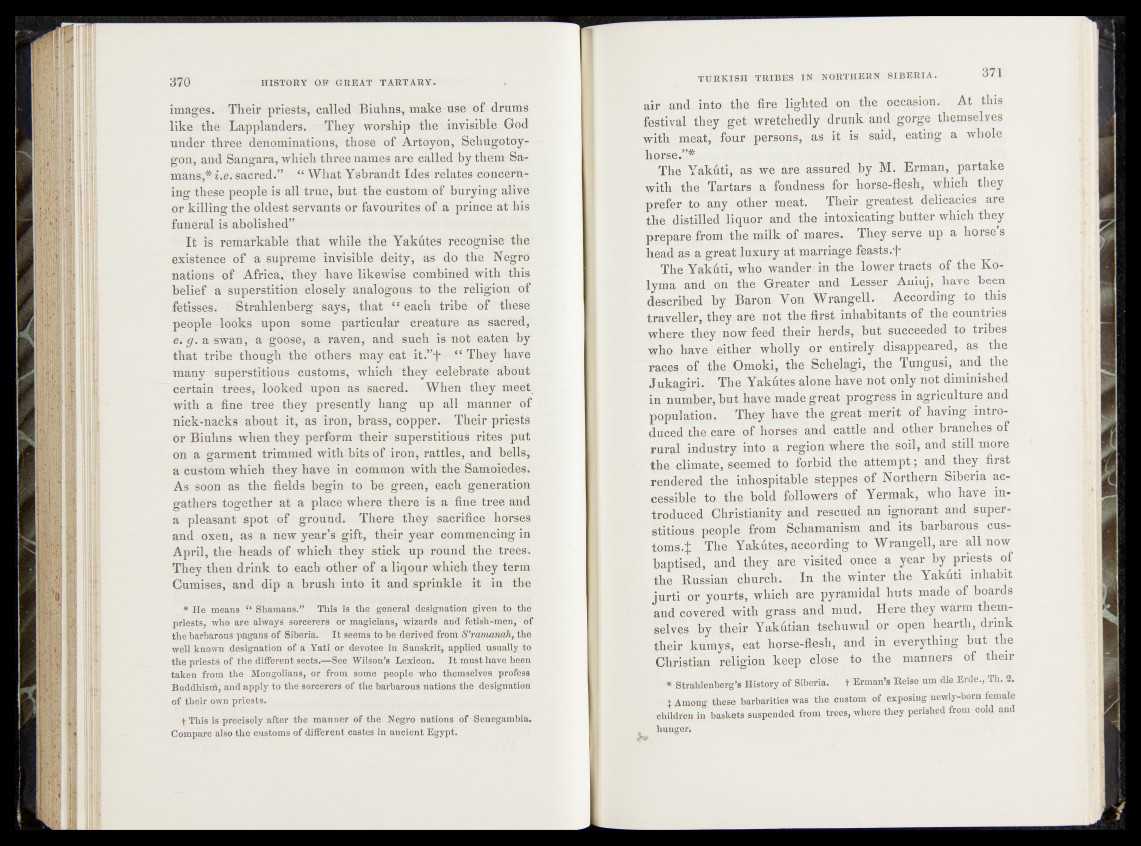
images. Their priests, called Biuhns, make use of drums
like the Lapplanders. They worship the invisible God
under three denominations,' those ©f> Artoyon, Schugotoy-
gon, and Sangara, which three names are called by them 8a-
mans,#i.é. gaered*,*Mï“ What Ysbrandt Ides relates êbsètrn-
ing these people is all true, but the custom of burying alive
or killing the oldest servants or favourites of a prince at his
funeral is abolished^
It is remarkable that while the YakûtéS recognise the
existence of a supreme invisible deity, as do the Negro
nations of Africa, they have likewise combined with this
belief a superstition closely analogous to the religion of
fetisses. Strahlenberg says, that “ each tribe of these
people 4ooks upon some particular creature as sacred,
ë.g. a swan, a goose, a raven, and such is not eaten by
that ttibe though the others may eat it “ They* have
many superstitious customs, which they celebrate' about
certain trees, looked upon as sacred. When they meet,
with a fine tree they presently hang up all manner of
nick-nacks about it, as iron, brass, copper. Their priests
Or Biuhns when they perform their superstitious rites put
on a garment trimmed with bits of iron, rattles, and bells^
a custom which they have in coOimon.with the Samoiedes.
As soon as the fields begin to be green,’ each-generation
gathers together at a place where there is a fine tree and
a pleasant spot of ground. There they sacrifice i horses
and oxen, as a new year’s gift, their year commencing in
April, the heads of which they stick up round the trees.
They then drink to each other of a liqour which they term
Cumises, and dip a brush into it and sprinkle it in the
* He means 0 Shamans.** This is the general designation given to the
prîèsts, who are always sorcerers or magicians, wizards ahd fetish-men, of
the barbarous pagans of Siberia. It seems to be derived from 8 ’ramanah, the
well known designation of a Yati or devotee in Sanskrit, applied usually to
the priests of the different sects.—See Wilson’s Lexicon. It must have, been
taken from the, Mongolians, or from some people who themselves profess
Biiddhisri, and apply to the sorcerers of the barbarous nations the designation
of theiy own priests.,
t This is precisely after the manner of the Negro nations of Senegambia,
Compare also the customs of différent castes in ancient Egypt.
ak and into the fim lighted ou the occasion. At this
festival they get wretchedly drunk and gorge themselves
with meat,' .§3ur persons, as it is said, eating a whole
horse.”*
The Yakuti, as we are assured by M. Erman, partake
with the Tartars a fondpess for horse-flesh, which they
prefer to any other meat. Their greatest delicacies are
the distilled, liqupr and the intoxicating butter, which they
prepare from the milk of.mqrps,, They serve up a horse’s
head as a great luxury at marriage feasts-rfv
.The Yakûti, who wander-in th e ,lower tracts of the Kolyma
and on the Greater -and Lesser. Aniuj, have been
described by Baron Yon Wrangell. According to this
traveller,, they^arp not. the first inhabitants of the countries
where they now feed .their herds, hut succeeded to tribes
who have- either wholly, or entirely disappeared, as the
races of the Omoki, the Bcheligi, the .Trmgusi, and the
Jukagiri. i. The Yakûtes alone, have,not only-not diminished
in number, but have made great progress in agriculture and
population. They have the great merit of having introduced
.the care .of horses, and cattle and other branches of
rural industry into a region where B B f f i an^ still more
the climate, seemed to forbid the attempt ; and they first
rendered the inhospitable steppes of Northern Siberia accessible
to the bold followers o | • Yermak, who have introduced
Christianity and rescued, an ignorant and superstitious
people from Sehamanism and its barbarous customs.
% The Yakuts* according to Wrangell, are all now
baptised, and they are visited once a year by priests of
the Russian church. In the winter the Yakuti inhabit
jurti or yourts, which are pyramidal huts made of boards
and covered with grass and mud. Here they warm themselves
by their Yakûtian tsehuwal or open hearth, drink
their kumys, eat horse-flesh, and .in everything but the
Christian religion keep close to the manners of their
* Str&hlenberg’s History of Siberia. t Ermam’s Reise wm die Erde., Th. 2.
t Among these barbarities was the custom of exposing newly:bora female
children in baskets suspended from trees, where they perished from cold and
hunger.